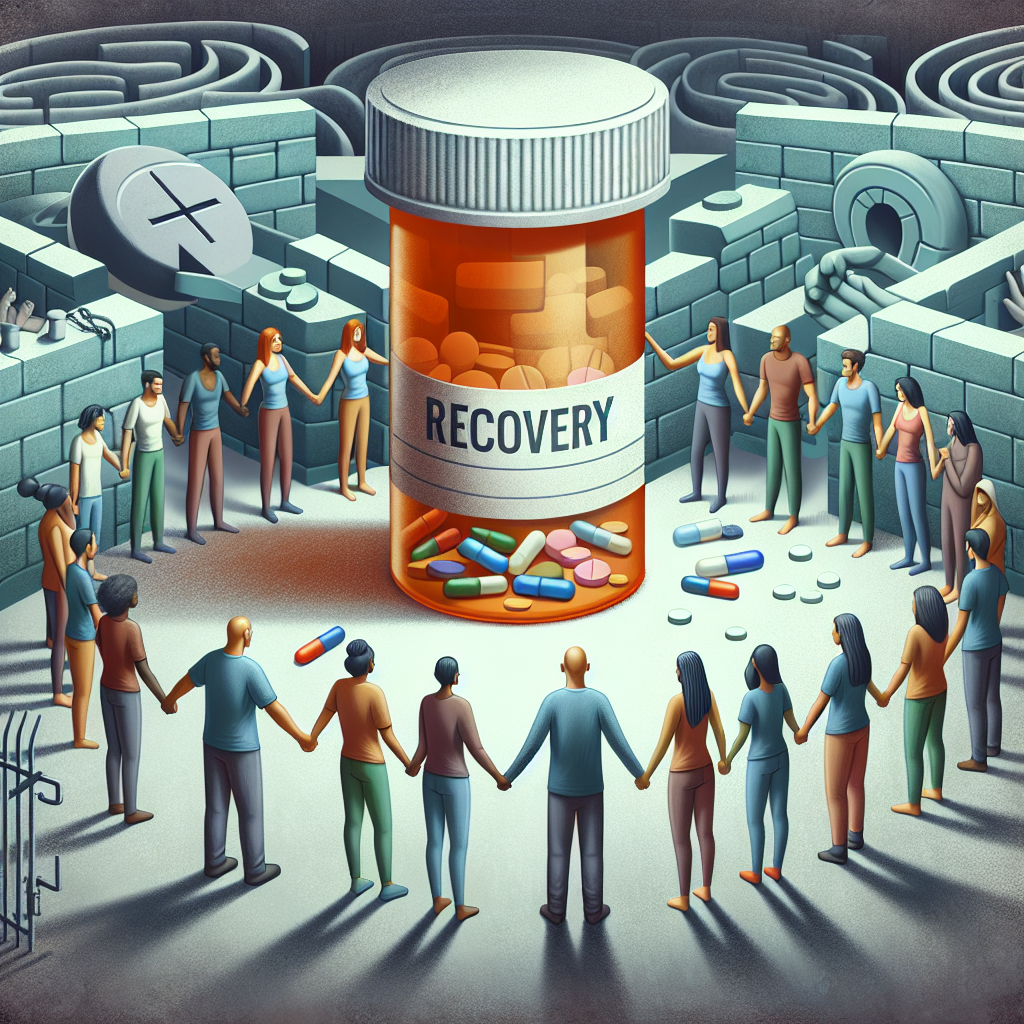-
Table of Contents

“Uncover, Heal, Transform: Addressing the Root of Prescription Drug Recovery”
Introduction
Addressing underlying issues in prescription drug recovery is a critical component of effective treatment and long-term sobriety. This approach recognizes that substance abuse often stems from deeper psychological, emotional, or social problems that must be identified and treated to prevent relapse. By focusing on the root causes of addiction, such as trauma, mental health disorders, or chronic pain, healthcare providers can develop comprehensive, individualized treatment plans that not only address the physical aspects of dependency but also promote overall mental and emotional well-being. This holistic strategy is essential for fostering sustainable recovery and helping individuals rebuild their lives free from the grip of prescription drug abuse.
Identifying Root Causes: The Key to Effective Prescription Drug Recovery
Addressing the underlying issues in prescription drug recovery is a crucial step toward achieving long-term sobriety and overall well-being. While the initial focus of recovery often centers on detoxification and managing withdrawal symptoms, it is equally important to delve deeper into the root causes that led to the dependency in the first place. By identifying and addressing these underlying issues, individuals can develop a more comprehensive and sustainable approach to recovery.
One of the primary root causes of prescription drug dependency is often related to mental health issues. Conditions such as anxiety, depression, and post-traumatic stress disorder (PTSD) can drive individuals to misuse prescription medications as a form of self-medication. Therefore, it is essential to incorporate mental health treatment into the recovery process. This can include therapy, counseling, and sometimes medication management under the guidance of a healthcare professional. By treating the mental health conditions that contribute to substance abuse, individuals can reduce their reliance on prescription drugs and develop healthier coping mechanisms.
In addition to mental health issues, environmental factors play a significant role in prescription drug dependency. Stressful life events, such as the loss of a loved one, financial difficulties, or relationship problems, can trigger or exacerbate substance abuse. Addressing these environmental factors involves creating a supportive and stable living environment. This may include family therapy, support groups, and community resources that provide a network of support. By fostering a positive and nurturing environment, individuals are better equipped to handle life’s challenges without resorting to prescription drugs.
Another critical aspect of addressing underlying issues in prescription drug recovery is understanding the role of genetics and family history. Research has shown that individuals with a family history of substance abuse are more likely to develop similar issues. Recognizing this genetic predisposition can help tailor recovery programs to address specific vulnerabilities. Genetic counseling and education can empower individuals with the knowledge to make informed decisions about their health and recovery journey.
Furthermore, addressing physical health issues is an integral part of the recovery process. Chronic pain or other medical conditions can lead to the misuse of prescription medications. A comprehensive recovery plan should include pain management strategies that do not rely solely on prescription drugs. This can involve physical therapy, alternative treatments such as acupuncture or chiropractic care, and lifestyle changes like exercise and nutrition. By managing physical health issues holistically, individuals can reduce their dependence on prescription medications and improve their overall quality of life.
It is also important to recognize the role of social and cultural factors in prescription drug dependency. Societal pressures, cultural norms, and peer influences can all contribute to substance abuse. Addressing these factors requires a multifaceted approach that includes education, awareness campaigns, and community involvement. By challenging stigmas and promoting healthy behaviors, society can create an environment that supports recovery and reduces the risk of prescription drug misuse.
In conclusion, identifying and addressing the root causes of prescription drug dependency is essential for effective recovery. By incorporating mental health treatment, creating a supportive environment, understanding genetic predispositions, managing physical health issues, and addressing social and cultural factors, individuals can develop a comprehensive and sustainable approach to recovery. This holistic approach not only helps individuals overcome their dependency but also empowers them to lead healthier, more fulfilling lives. Through dedication, support, and a commitment to addressing underlying issues, long-term recovery is not only possible but achievable.
Holistic Approaches to Addressing Underlying Issues in Prescription Drug Recovery
In the journey of prescription drug recovery, addressing underlying issues is paramount to achieving lasting success. Holistic approaches, which consider the whole person rather than just the symptoms of addiction, have gained recognition for their effectiveness in this regard. By integrating physical, emotional, and spiritual healing, these methods offer a comprehensive path to recovery that goes beyond mere abstinence.
One of the key aspects of holistic recovery is the recognition that addiction often stems from deeper, unresolved issues. These can include trauma, mental health disorders, or chronic stress. Traditional treatment methods may focus primarily on detoxification and behavioral therapy, but without addressing these root causes, the risk of relapse remains high. Holistic approaches, on the other hand, aim to uncover and heal these underlying issues, thereby reducing the likelihood of returning to substance use.
For instance, trauma-informed care is a crucial component of holistic recovery. Many individuals struggling with prescription drug addiction have experienced significant trauma in their lives. This could range from childhood abuse to witnessing violence or enduring a major loss. Trauma-informed care involves creating a safe and supportive environment where individuals can process these experiences without fear of judgment. Techniques such as Eye Movement Desensitization and Reprocessing (EMDR) and somatic experiencing are often employed to help individuals release the emotional pain associated with their trauma.
In addition to addressing trauma, holistic approaches also emphasize the importance of mental health. Co-occurring disorders, such as depression or anxiety, are common among those with substance use disorders. Treating these conditions concurrently with addiction is essential for a successful recovery. Holistic methods often incorporate therapies like cognitive-behavioral therapy (CBT) and dialectical behavior therapy (DBT), which are effective in managing mental health symptoms. Moreover, practices such as mindfulness meditation and yoga can help individuals develop coping strategies and improve their emotional regulation.
Physical health is another critical component of holistic recovery. Substance abuse can take a severe toll on the body, leading to nutritional deficiencies, weakened immune systems, and other health issues. Holistic approaches often include nutritional counseling, exercise programs, and alternative therapies like acupuncture and massage. These interventions not only help restore physical health but also promote overall well-being, making it easier for individuals to maintain their recovery.
Spirituality, though often overlooked, plays a significant role in holistic recovery. For many, addiction creates a sense of disconnection from oneself and the world. Reconnecting with a sense of purpose and meaning can be incredibly healing. This doesn’t necessarily involve religious practices; rather, it can be about finding a sense of inner peace and connection. Activities such as meditation, nature walks, and creative expression can help individuals explore their spirituality and foster a sense of belonging and purpose.
Furthermore, social support is a cornerstone of holistic recovery. Building a strong support network can provide the encouragement and accountability needed to stay on the path to recovery. This can include family therapy, support groups, and community involvement. By fostering healthy relationships and a sense of community, individuals are less likely to feel isolated and more likely to thrive in their recovery journey.
In conclusion, holistic approaches to prescription drug recovery offer a multifaceted and compassionate path to healing. By addressing the underlying issues of trauma, mental health, physical well-being, spirituality, and social support, these methods provide a comprehensive framework for lasting recovery. Embracing a holistic approach not only helps individuals overcome addiction but also empowers them to lead fulfilling and meaningful lives.
Q&A
1. **Question:** What are some common underlying issues that need to be addressed in prescription drug recovery?
**Answer:** Common underlying issues include mental health disorders (such as depression and anxiety), chronic pain, trauma or past abuse, and social or environmental factors like family dynamics and peer pressure.
2. **Question:** How can addressing underlying issues improve the effectiveness of prescription drug recovery?
**Answer:** Addressing underlying issues can improve recovery by reducing the risk of relapse, enhancing overall mental and physical health, providing coping strategies for stress and triggers, and fostering a supportive environment for long-term sobriety.
Conclusion
Addressing underlying issues in prescription drug recovery is crucial for achieving long-term sobriety and overall well-being. By identifying and treating the root causes of addiction, such as mental health disorders, trauma, or chronic pain, individuals are better equipped to manage their conditions without relying on prescription drugs. Comprehensive treatment plans that include therapy, support groups, and medical care can help individuals develop healthier coping mechanisms and reduce the risk of relapse. Ultimately, a holistic approach that addresses both the symptoms and the underlying issues of addiction is essential for sustainable recovery and improved quality of life.



